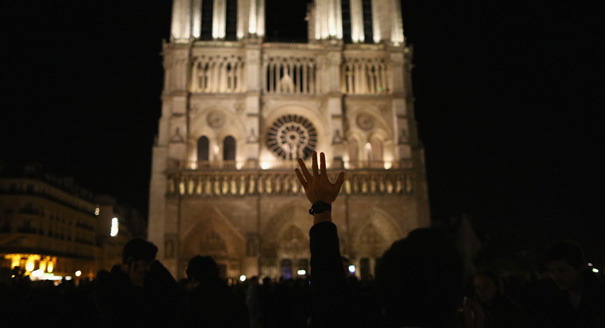Russians can be evacuated from Egypt and they do not have to return there, but you cannot take Parisians out of Paris or keep Frenchmen out of France.
The massacres in Paris last Friday represent what could be called the opening of a “second front” for the self-proclaimed Islamic State. The jihadists’ main area of operations remains the Middle East and their main victims are still the people of Iraq and Syria. In the last few weeks, the jihadists have committed horrific atrocities in Ankara and Beirut.
But by attacking Russian and French civilians, the Islamic State is extending the “borders of darkness” within which it operates. It is throwing down a challenge to Russia and the Western powers, who are still adversaries over Ukraine but now find themselves sharing the pain of suffering attacks by the same perpetrator.
For the jihadists, there is no difference between Paris and St. Petersburg, the home city of the passengers who died on the Metrojet Airbus A321 that crashed over the Sinai Peninsula on October 31. They believe that they are waging war against the Western world, Western culture, and global modernity. Paris is getting punished for being one of the places that gave birth to modernity, just as New York was in 2001.
The Western culture that was assaulted in Paris is grounded in rationality, and the right response at this critical moment should be a rational one. It would be odd for the West to be swayed by the approach of the most emotional critics of the Russian regime, who insist on not doing, writing, or saying anything that Putin might like.
Of course, the Ukraine issue cannot simply go away. There is still a lot of difficult negotiating to do and Ukraine cannot just be traded away. On the other hand, Ukraine should not be a reason for carrying on as before when other threats emerge.
The Islamic State problem is bigger than the Iranian nuclear program, the maintenance of the International Space Station, or the transit of NATO cargo to Afghanistan. It deserves separate consideration, irrespective of grievances against Russia on other issues. The Obama-Putin meeting at the G-20 summit in Turkey reflected that and showed that the two presidents have an interest in more than merely frustrating one other.
The synchronized attacks on the Russian airplane over Egypt and in Paris connect the Russian and Western campaigns in Syria. True, Russia was not invited by the West to join the campaign in Syria. Russia did so for its own reasons. Russian citizens have the right to question their government’s actions—though unfortunately few channels for doing so. But Western politicians should respect the fact that residents of both Paris and St. Petersburg have now been targeted by the same perpetrator. It is not really appropriate to discuss whether one country or another is more to blame—we should only say that the Islamic State is above all a consequence of the 2003 Iraq War, and that everything else is secondary.
There is a deeper reality here, which is that the jihadists’ attacks render meaningless all talk of Russia as a “unique civilization.” Russian ideologists and politicians have gotten used to describing Russia as “a good Europe” or, better still, as not Europe at all. To them, Russia is not the West, but rather a world of traditional conservative values that Russia shares with “the East.”
The Islamic State has reminded Russia that this argument cuts no ice with the hardest-core Middle Eastern conservatives, who see Russia as just another part of the Western world that deserves to be attacked.
So Russia needs to cure its split personality disorder. All of Russia’s weird anti-Western rhetoric, and the references to “Orthodox Iran” or “our own Islamic State”, stand in the way of the foreign policy goal that Vladimir Putin set out in his speech to the UN General Assembly in September: creating a global alliance against terrorism.
The geography of terrorism is losing its borders. For years, there has been a tendency to make a distinction between terrorist threats in Russia and Europe. For the average Westerner—and the average Russian for that matter—if something bad happens in Russia, the root cause lies within Russia itself, but if misfortunes befall the West, we should seek causes outside the West’s borders.s
The average person—and this includes politicians and journalists—does not divide the world into categories of democracies and authoritarian regimes, old and new markets, or developed and developing countries. He is more likely to perceive two zones, one of light and one of darkness. In what the Indian writer V.S. Naipaul called an “area of darkness,” tragedy and disaster are regarded as everyday occurrences, while in other parts of the world—areas of light—tragic events are viewed as an aberration.
When we look at last Friday in Paris and the recent litany of terrorist attacks in France, we see this distinction blurring. This year, France more resembles a country from the dark zone, where the terrible has become almost commonplace. Its troubles evoke Mikhail Bulgakov’s poetic description of Jerusalem in The Master and Margarita: “The darkness that came from the Mediterranean Sea blotted out the great city. The suspension bridges, the crenellated palace, the bazaars, the caravanserai, the alleyways, the pools... Jerusalem, the great city, vanished as though it had never been. The darkness devoured everything, frightening every living creature in Jerusalem and its surroundings.”
The lesson of the Paris attacks is: as the area of darkness shifts, even a strong state’s borders do not protect against it anymore. Europeans can no longer neatly divide the world into a realm of light, where bad things aren’t supposed to happen, and a dark realm, where they routinely occur. Darkness from one place will creep into others. Perhaps the world needs to regain its clarity, but the biggest priority is to make an honest effort to tackle the real heart of darkness.
